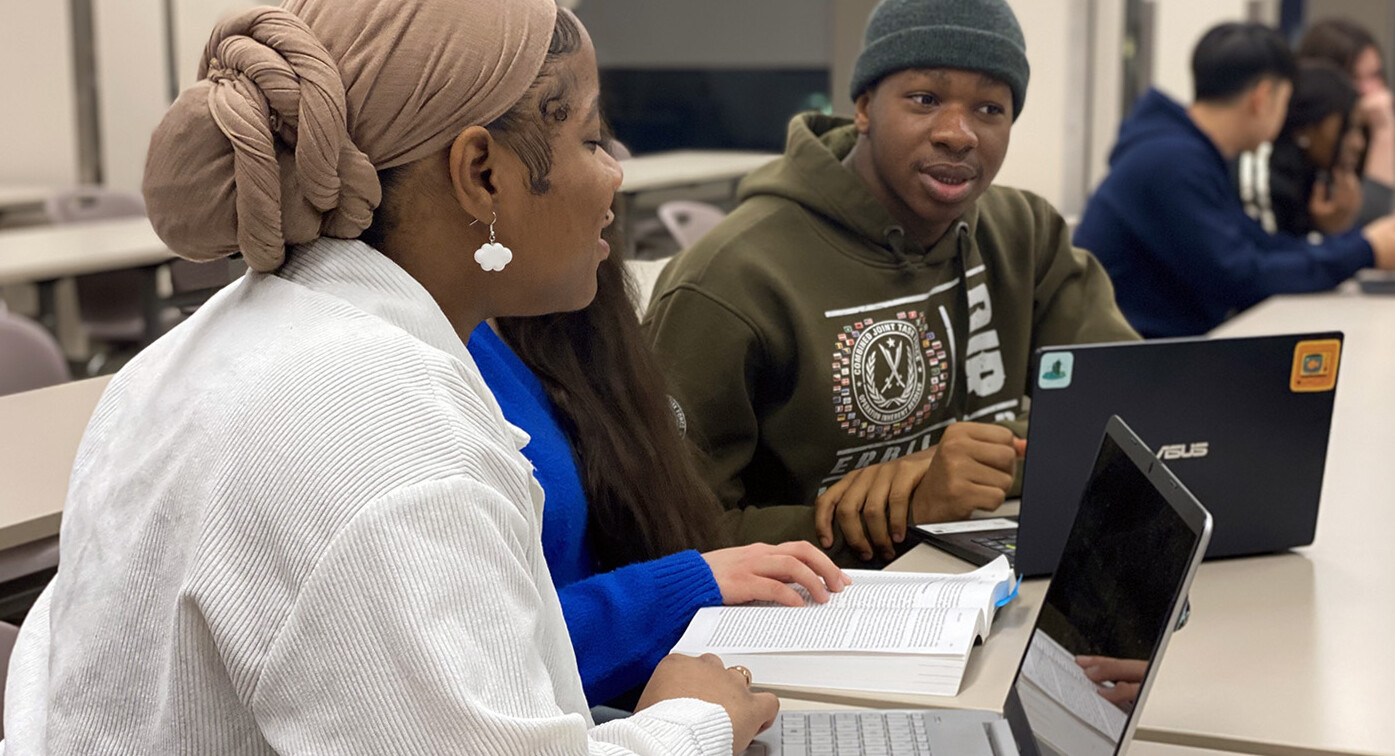A Bachelor of Arts in Psychology from Booth University College offers many career prospects. Our unique program addresses practical social, cultural, and diversity issues. An emphasis on ethics and experiential learning means you'll graduate with practical skills that transfer to a variety of roles.
Overview
The Bachelor of Arts (BA) in Psychology can be competed in:
- 4 years (120 credit hours)
- 3-year Community Mental Health stream
Psychology is the study of the human mind and behaviour. It's the study of people. We'll examine factors that influence our thoughts, actions, interactions, beliefs, values, and attitudes.
Studying psychology will help you understand yourself and others. You’ll develop critical thinking and analytical skills. You'll also become an exceptional listener and communicator.
Our program is recognized across North America. It meets or exceeds standards outlined by the Canadian Psychological Association and American Psychological Association.
Optional Streams
- Core Psychology: our core Bachelor of Arts in Psychology program.
- Community Mental Health: focuses on social psychology, community psychology, social change, and neuroscience. Courses are streamlined toward critical counselling and intervention skills.
- Applied Psychology: this stream focuses on the practical application of psychology, and includes two internships.
- Honours Program: students complete an independent research project and thesis.
You have the option to specialize in Applied Psychology, our Honours program, or both.
Studying at Booth UC
Our Psychology program is unique from other programs in Canada.
- It addresses practical social, cultural, and diversity issues, with an added emphasis on ethics. The program prepares you to be a valuable contributor in today's diverse workplaces.
- Our classes are small. At many institutions, first-year psychology classes have hundreds of students. Our small classes allow you to form meaningful connections with your classmates and professors.
- Our professors get to know you personally so they can offer individualized guidance.
- We provide research apprenticeships.
- Our internship program lets you gain hands-on experience.
In a Booth UC Psychology degree, you learn and practice your growing skills as a psychologist all at once.
Internship
Gain hands-on experiential learning working in agencies and institutions here in Winnipeg. This is an opportunity to apply your knowledge in a working environment.
You'll get valuable experiences and references that can help you secure a job after graduation.
Research Opportunity
Research apprenticeships are usually only available to graduate students. At Booth UC, you'll have the opportunity to collaborate with a professor on a research project.
What You'll Learn
Here’s what you can expect to learn in this program, in addition to our Institutional Learning Outcomes:
Develop knowledge in the discipline of psychology that covers sociocultural and diversity issues, human development, learning and information processing, and biological contributions to behaviour.
- Describe key concepts, principles, and overarching themes in psychology.
- Show a working knowledge of psychology’s content domains.
- Describe applications of psychology.
Develop skills in the application of scientific inquiry and critical thinking.
- Use scientific reasoning to interpret psychological phenomena.
- Prove psychological information literacy.
- Demonstrate innovative and integrative thinking and problem-solving.
- Demonstrate interpretation, design, and conduct of basic psychological research.
- Show incorporation of sociocultural factors in scientific inquiry.
Develop ethical and social responsibility in a diverse world.
- Prove the ability to apply ethical standards to evaluate psychological science and practice.
- Demonstrate the ability to build and enhance interpersonal relationships.
- Describe key values that build community at local, national, and global levels.
Develop effective communication skills.
- Show effective writing for different purposes.
- Demonstrate effective presentation skills.
- Prove the ability to interact effectively with others.
Develop professionally.
- Describe how to apply psychological content and skills to career goals.
- Demonstrate self-efficacy and self-regulation.
- Demonstrate project-management skills.
- Exhibit the ability to enhance teamwork capacity.
- Describe a meaningful professional direction for life after graduation.
As a Christian University College, we also strive to:
Develop sensitivity to sociocultural, international, and diversity issues.
- Describe how psychology can be used to understand different perspectives and worldviews, including those of Christianity and other faiths.
- Demonstrate knowledge about how psychology can differ across cultures.
- Exhibit tolerance to different worldviews while also being able to engage in critical dialogue in relation to both a Christian faith and the discipline of psychology.
Develop an ability to apply psychological theory in the community.
- Describe how psychology can be used to enhance social justice and aid marginalized populations in order to further social justice.
- Exhibit the ability to conduct basic research for the betterment of the community.
- Describe how psychological theory can be applied to rectify social problems and inequities.
- Describe the strengths and limitation involved in community-based research.
Your Future
This program opens the doors to a variety of fulfilling careers, including positions in:
- Personnel
- Labour relations
- Social services
- Health services
- Mental health
- Correctional service
Interested in psychology as a career? This degree sets you up to pursue a Master or PhD, allowing you to become a psychological scientist, university professor, or clinical psychologist. It also prepares you for professional programs such as social work, education, and law.
Our graduates have gone on to work with refugees and immigrants, children struggling with conditions of poverty, Indigenous communities, people with neurodevelopmental disorders, and many other meaningful roles.
Many students get employed in the same places they completed internships. Others have continued on to graduate programs around the world.
“One of the reasons I went into Psychology was to help people like me. [Indigenous] communities need professionals to help with the mental health crisis. I want to be part of that. Booth UC helped me grow into the person I am today; someone I am pretty proud of. Each and every person at the school has helped shape me in some way. I’m grateful for that.
- Valentina McKay (BA/20)

Course Requirements
For course details, visit the Academic Calendar.
Core Psychology
(4-year/120 credits)
- Minimum of 120 credit hours
- 42 credit hours in the core curriculum
- 60 credit hours in psychology or approved courses.
- Required courses for all 4-year psychology students (36 credits):
- PSY120 Introduction to Psychology I (3)
- PSY121 Introduction to Psychology II (3)
- SOC100 Introduction to Sociology (6)
- BHS200 Research Methods (3)
- PSY221 Development Across the Lifespan (3)
- PSY256 Introduction to Human Cognition (3)
- PSY258 Social Psychology (3)
- BHS300 Statistics for the Behavioural Sciences I (3)
- BHS301 Statistics for the Behavioural Sciences II (3)
- PSY370 Brain & Behaviour (3)
- PSY499 History & Theory in Psychology (3)
- Psychology Elective Courses (24 credits):
- BHS350 Behavioural Sciences Internship (3)
- BHS456 Seminar in Cognitive Science (3)
- PSY210 Counselling Theory & Applications (3)
- PSY225 Research Apprenticeship I (3)
- PSY260 Abnormal Psychology (3)
- PSY310 Psychology of Religion (3)
- PSY315 Sociocultural Psychology & Educational Travel (3)
- PSY320 Personality (3)
- PSY321 Culture & Human Development (3)
- PSY325 Research Apprenticeship II (3)
- PSY335 Health Psychology (3)
- PSY352 Forensic & Legal Psychology (3)
- PSY354 Community Psychology (3)
- PSY355 Consumer Psychology (3)
- PSY356 Applied Cognitive Psychology (3)
- PSY360 Memory (3)
- PSY380 Psychology & the Workplace (3)
- PSY390 Directed Readings in Psychology (3)
- PSY395 Select Themes in Psychology (3)
- PSY421 Psychology of Immigration and Adjustment (3)
- PSY450 Psychology Internship (3)
- PSY480 Leading Change in an Organization (3)
Community Mental Health
(3-year/90 credits)
- Minimum of 90 credit hours
- 42 credit hours in the core curriculum
- 48 hours in psychology, sociology, or approved courses
- Required courses for all Community Mental Health students (42 credit hours)
- PSY120 Introduction to Psychology I (3)
- PSY121 Introduction to Psychology II (3)
- SOC 100 Introduction to Sociology (6)
- BHS 200 Research Methods (3)
- PSY210 Counseling Theory & Applications (3)
- PSY221 Development Across the Lifespan (3)
- PSY258 Social Psychology (3)
- PSY260 Abnormal Psychology (3)
- SOC210 Social Problems (3)
- BHS300 Statistics for the Behavioural Sciences (3)
- BHS301 Application of Statistics and Quantitative Research (3)
- PSY354 Community Psychology (3)
- SOC370 Social Change (3)
- Psychology / Sociology Elective Courses (6 credit hours):
- PSY256 Introduction to Human Cognition (3)
- PSY310 Psychology of Religion (3)
- PSY315 Sociocultural Psychology & Educational Travel (3)
- PSY320 Personality (3)
- PSY352 Forensic & Legal Psychology (3)
- PSY370 Brain & Behaviour (3)
- PSY380 Psychology & the Workplace (3)
- SOC240 Sociology of Families (3)
- SOC355 Human Diversity (3)
- SOC360 Gender, Race, and Class (3)
- SOC372 Sociology of Religion (3)
- SOC380 Social Theory (3)
Applied Psychology
(4-year/120 credits)
- Minimum of 120 credit hours
- 42 credit hours in the core curriculum
- 60 credit hours in psychology or approved courses.
- Required courses for all 4-year psychology students (36 credit hours):
- PSY120 Introduction to Psychology I (3)
- PSY121 Introduction to Psychology II (3)
- SOC100 Introduction to Sociology (6)
- BHS200 Research Methods (3)
- PSY221 Development Across the Lifespan (3)
- PSY256 Introduction to Human Cognition (3)
- PSY258 Social Psychology (3)
- BHS300 Statistics for the Behavioural Sciences I (3)
- BHS301 Statistics for the Behavioural Sciences II (3)
- PSY370 Brain & Behaviour (3)
- PSY499 History & Theory in Psychology (3)
- Required Courses for Applied Psychology Emphasis (15 credit hours):
- BHS350 Behavioural Sciences Internship (3)
- PSY450 Psychology Internship (3)
- At least 9 credit hours from:
- PSY210 Counselling Theory & Applications (3)
- PSY335 Health Psychology (3)
- PSY352 Forensic & Legal Psychology (3)
- PSY354 Community Psychology (3)
- PSY355 Consumer Psychology (3)
- PSY356 Applied Cognitive Psychology (3)
- PSY380 Psychology & the Workplace (3)
- Psychology Elective Courses (9 credits):
- BHS456 Seminar in Cognitive Science (3)
- PSY225 Research Apprenticeship I (3)
- PSY260 Abnormal Psychology (3)
- PSY310 Psychology of Religion (3)
- PSY315 Sociocultural Psychology & Educational Travel (3)
- PSY320 Personality (3)
- PSY321 Culture & Human Development (3)
- PSY325 Research Apprenticeship II (3)
- PSY390 Directed Readings in Psychology (3)
- PSY395 Select Themes in Psychology (3)
- PSY421 Psychology of Immigration and Adjustment (3)
- PSY480 Leading Change in an Organization (3)
Honours Psychology
(4-year/120 credits)
- Minimum of 120 credit hours
- 42 credit hours in the core curriculum
- 60 credit units in psychology or approved courses.
- Required courses for all 4-year psychology students (36 credits):
- PSY120 Introduction to Psychology I (3)
- PSY121 Introduction to Psychology II (3)
- SOC100 Introduction to Sociology (6)
- BHS200 Research Methods (3)
- PSY221 Development Across the Lifespan (3)
- PSY256 Introduction to Human Cognition (3)
- PSY258 Social Psychology (3)
- BHS300 Statistics for the Behavioural Sciences I (3)
- BHS301 Statistics for the Behavioural Sciences II (3)
- PSY370 Brain & Behaviour (3)
- PSY499 History & Theory of Psychology (3)
- Required Courses for Honours Psychology Emphasis (6 credits):
- PSY490 Honours Thesis Seminar I (3)
- PSY491 Honours Thesis Seminar II (3)
- Psychology Elective Courses (18 credits):
- BHS350 Behavioural Sciences Internship (3)
- BHS456 Seminar in Cognitive Science (3)
- PSY210 Counselling Theory & Applications (3)
- PSY225 Research Apprenticeship I (3)
- PSY260 Abnormal Psychology (3)
- PSY310 Psychology of Religion (3)
- PSY315 Sociocultural Psychology & Educational Travel (3)
- PSY320 Personality (3)
- PSY321 Culture & Human Development (3)
- PSY325 Research Apprenticeship II (3)
- PSY335 Health Psychology (3)
- PSY352 Forensic & Legal Psychology (3)
- PSY354 Community Psychology (3)
- PSY355 Consumer Psychology (3)
- PSY356 Applied Cognitive Psychology (3)
- PSY360 Memory (3)
- PSY380 Psychology & the Workplace (3)
- PSY390 Directed Readings in Psychology (3)
- PSY395 Select Themes in Psychology (3)
- PSY421 Psychology of Immigration and Adjustment (3)
- PSY450 Psychology Internship (3)
- PSY480 Leading Change in an Organization (3)
Admission Requirements
Review the admission requirements for this program, plus specific details for mature students, international students, and high school equivalencies for applicants outside Manitoba.
Contact Us
Our Admissions Team is happy to provide more information or help you through the application process. Contact us if you'd like to learn more about Booth University College or any of our programs.




